Food in Germany is known for its rich flavours, hearty portions, and traditional recipes passed down for generations. From savoury sausages to delicious desserts, German cuisine offers a variety of satisfying and unique dishes. Some famous foods in Germany include bratwurst, sauerbraten, and Schnitzel, which are enjoyed nationwide. Traditional German meals often feature meat, potatoes, and bread, with regional differences adding variety. Desserts like Black Forest Cake and Apfelstrudel are also popular. This guide explores the best dishes in Germany, highlighting its history, variations, and interesting facts.
10 Must-Try Foods In Germany
Explore the best food in Germany through these 10 delicious dishes you should definitely try.
1. Bratwurst
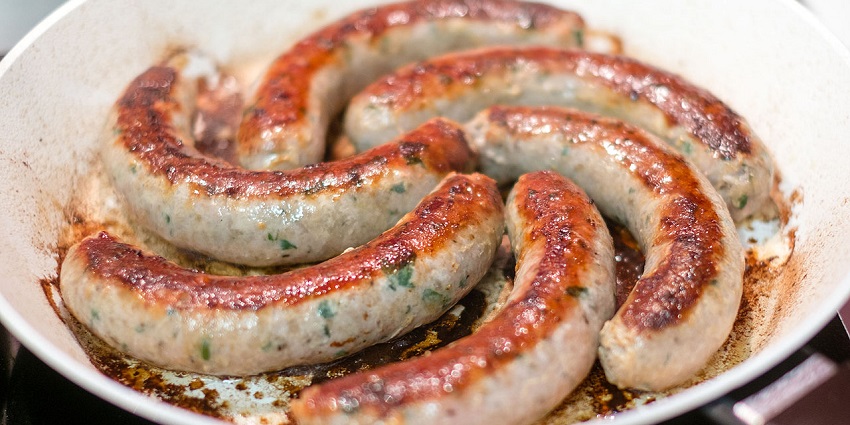
Photo: Alice Wiegand / Wikimedia Commons / Image For Representation Only
Bratwurst with a history dating back to the Middle Ages. This sausage is made from pork, beef, or veal and is flavoured with spices like nutmeg, ginger, and caraway. Traditionally, it was grilled over an open flame, but it is also pan-fried or boiled today. Each region has its version, such as the thin and spicy Thüringer Bratwurst and the small, flavourful Nuremberg Bratwurst. A fun fact is that Germany has over 40 different types of Bratwurst.
Location: Nuremberg, Thuringia, Coburg, Frankfurt, Stuttgart
Average Cost: ₹270 – 540
2. Schnitzel
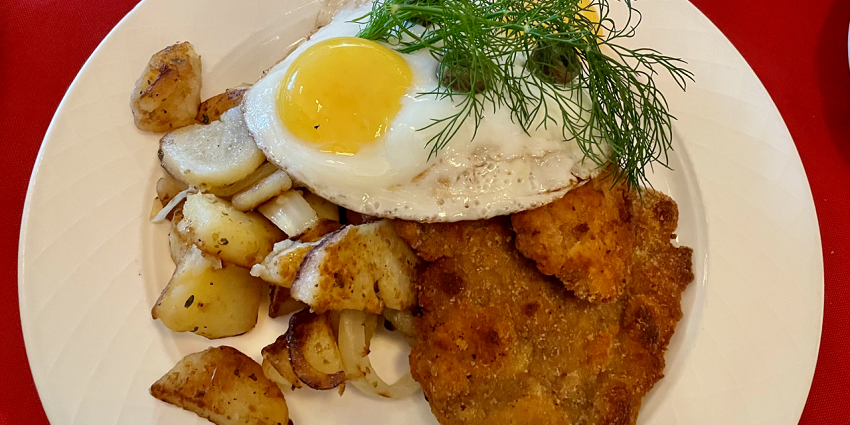
Photo: ZhengZhou / Wikimedia Commons / Image For Representation Only
Schnitzel loved for its crispy coating and tender meat inside. It originated in Austria but became popular in Germany with various adaptations. Traditionally, it is made from veal (Wiener Schnitzel), but the German version often uses pork, known as Schweineschnitzel. Modern variations include chicken and turkey schnitzels. A fun fact is that the word “Schnitzel” means “cutlet” in German. While it is rich in protein, the fried coating adds extra calories, so it is best eaten in moderation.
Location: Munich, Berlin, Hamburg, Cologne, Düsseldorf
Average Cost: ₹900 – 1350
3. Sauerbraten
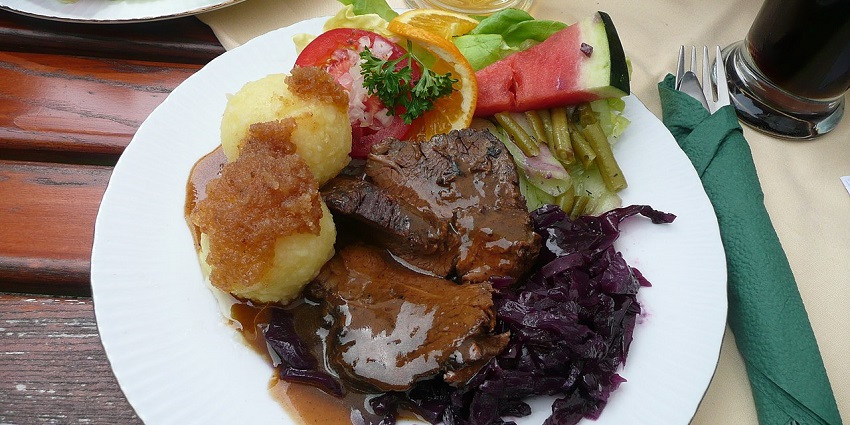
Photo: Brücke-Osteuropa / Wikimedia Commons / Image For Representation Only
Sauerbraten has been a part of food in Germany for centuries. The name means “sour roast” because the meat is marinated in vinegar, spices, and herbs for several days before cooking. It was originally made with horse meat but is now commonly prepared with beef. Different regions have their own styles, such as the Rhineland version, which tastes slightly sweet due to added raisins or sugar. A fun fact is that Sauerbraten was once a way to preserve meat before refrigeration.
Location: Stuttgart, Ulm, Freiburg, Munich, Augsburg
Average Cost: €12-€18 (₹1080 – 1620)
4. Spätzle
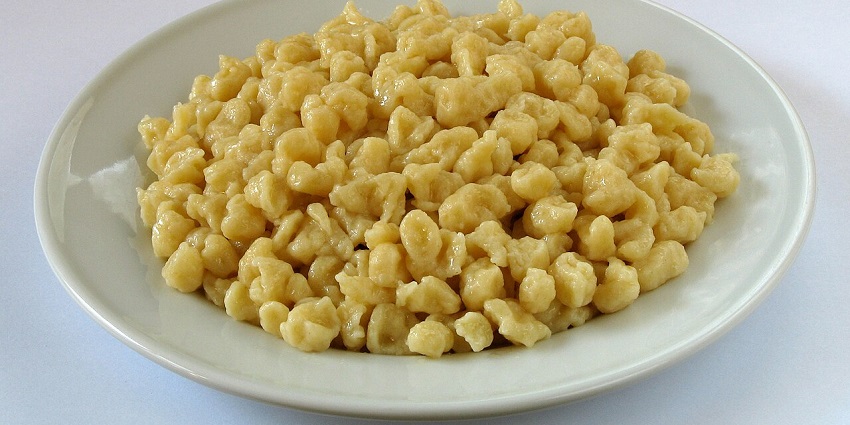
Photo: Kobako / Wikimedia Commons / Image For Representation Only
Spätzle, especially in the southern regions. It dates back to the 18th century and was a staple for farmers and workers because it was easy to make and fill. The dough is made from flour, eggs, and water and is hand-cut or pressed through a special tool. Traditional Spätzle is plain, but the modern Käsespätzle version includes cheese and caramelised onions. A fun fact is that Spätzle means “little sparrows” in German.
Location: Stuttgart, Ulm, Freiburg, Munich, Augsburg
Average Cost: €8 – €12 (₹720 – 1080)
5. Apfelstrudel
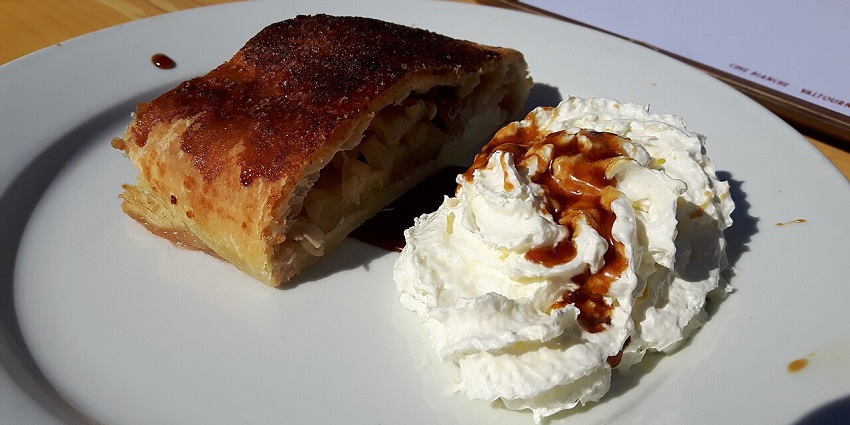
Photo: FakirNL / Wikimedia Commons / Image For Representation Only
Apfelstrudel is a delicious apple-filled pastry that is one of the most famous cuisines in Germany. It originated in Austria during the Habsburg Empire and became popular in Germany. The pastry is made by stretching the dough until it is paper-thin, then filling it with spiced apples, sugar, and raisins. Traditional versions use butter and flaky layers, while modern recipes may include nuts or custard. A fun fact is that making perfect Apfelstrudel requires skill, as the dough should be thin enough to read through.
Location: Munich, Berlin, Dresden, Stuttgart, Nuremberg
Average Cost: ₹360 – 630
6. Black Forest Cake
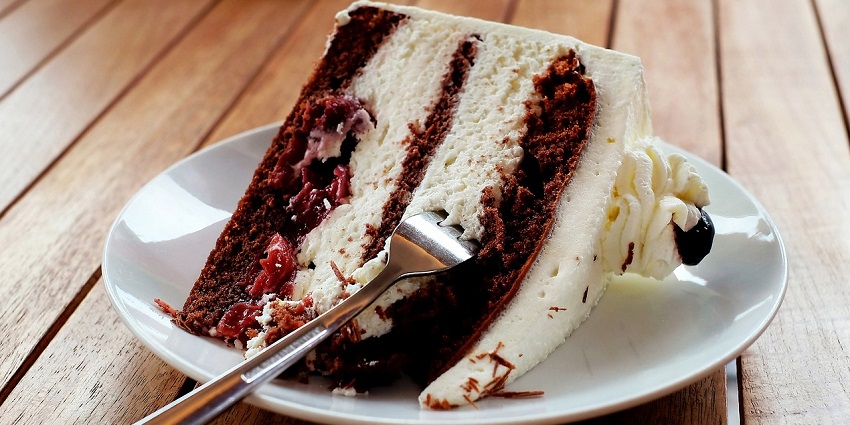
Photo: Couleur / Pixabay / Image For Representation Only
Black Forest Cake, or Schwarzwälder Kirschtorte, is one of the best dishes in Germany regarding desserts. It originated in the Black Forest region and became widely popular in the 20th century. This rich cake comprises layers of chocolate sponge, whipped cream, and cherries, with a touch of cherry schnapps for flavour. The traditional version is made with Kirschwasser (cherry brandy), while modern versions may skip the alcohol. A fun fact is that the cake is named after the Black Forest region’s famous cherry trees.
Location: Black Forest region, Freiburg, Stuttgart, Baden-Baden, Karlsruhe
Average Cost: ₹450 – 810
7. Sauerkraut
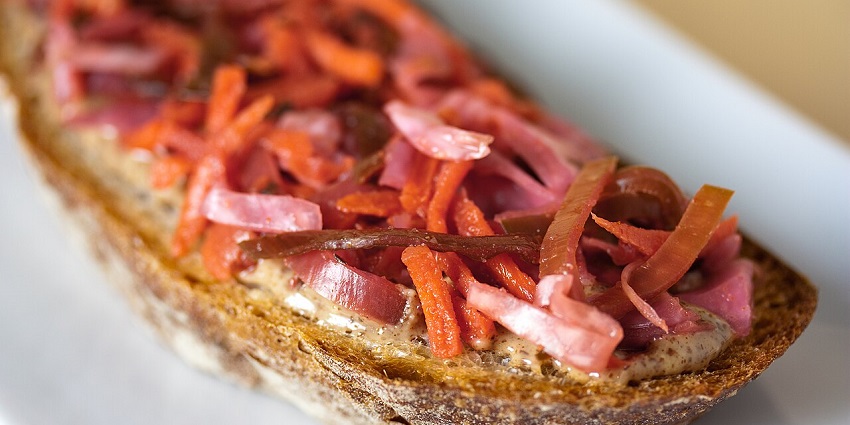
Photo: Veganbaking.net / Wikimedia Commons / Image For Representation Only
Sauerkraut is known for its tangy taste and long history. It dates back over 2,000 years, originally brought to Europe from China. It is made by fermenting finely chopped cabbage with salt, which gives it a sour flavour and a crunchy texture. Traditionally, it was a winter food as it could be stored for months without spoiling. Today, some modern versions include extra spices or carrots for added flavour. A fun fact is that sailors used Sauerkraut to prevent scurvy. It is rich in probiotics, making it good for digestion.
Location: Berlin, Hamburg, Frankfurt, Cologne, Leipzig
Average Cost: ₹270 – 540
8. Currywurst
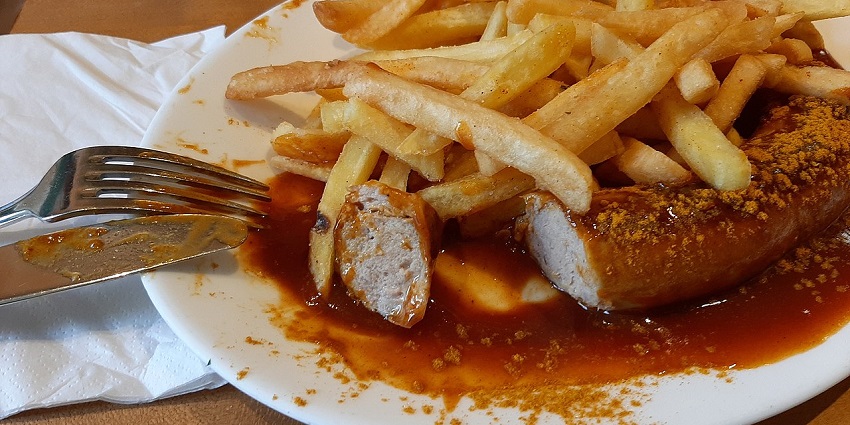
Photo: Ziko van Dijk / Wikimedia Commons / Image For Representation Only
Currywurst was created in 1949 by a German woman named Herta Heuwer, who mixed ketchup with curry powder to create a unique sauce. The dish consists of sliced sausage covered in this special sauce and is usually served with fries. Traditional Currywurst is made with pork sausage, but modern versions also include chicken or vegan options. A fun fact is that Berlin has a museum dedicated to Currywurst. While tasty, it is high in sodium and should be eaten in moderation.
Location: Berlin, Hamburg, Ruhr Valley, Düsseldorf, Hanover
Average Cost: ₹360 – 720
9. Rouladen
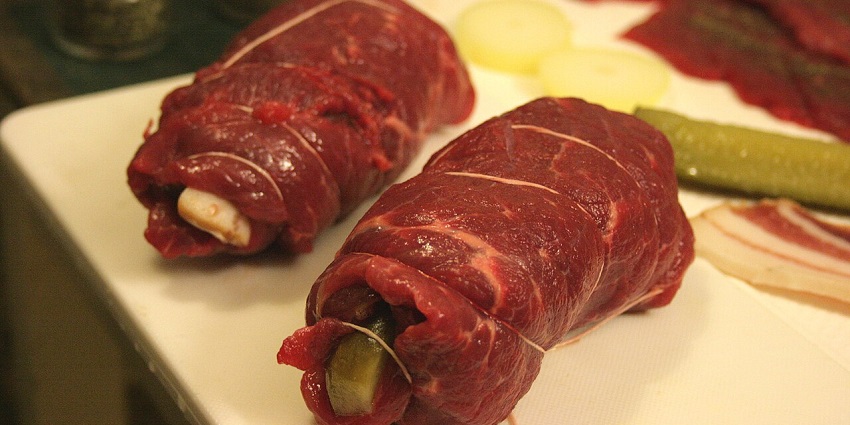
Photo: Tamorlan / Wikimedia Commons / Image For Representation Only
Rouladen is made from thin beef slices rolled around bacon, onions, pickles, and mustard. It is a traditional Sunday meal and is often served on special occasions. The dish dates back to the 16th century and was originally prepared with veal. Over time, beef became the preferred meat, though some regions still use pork. Traditional Rouladen is slow-cooked in a rich gravy, while modern variations may include different fillings. A fun fact is that Rouladen is often served with red cabbage and potato dumplings.
Location: Dresden, Leipzig, Munich, Frankfurt, Nuremberg
Average Cost: ₹1080 – 1620
10. Kartoffelsalat
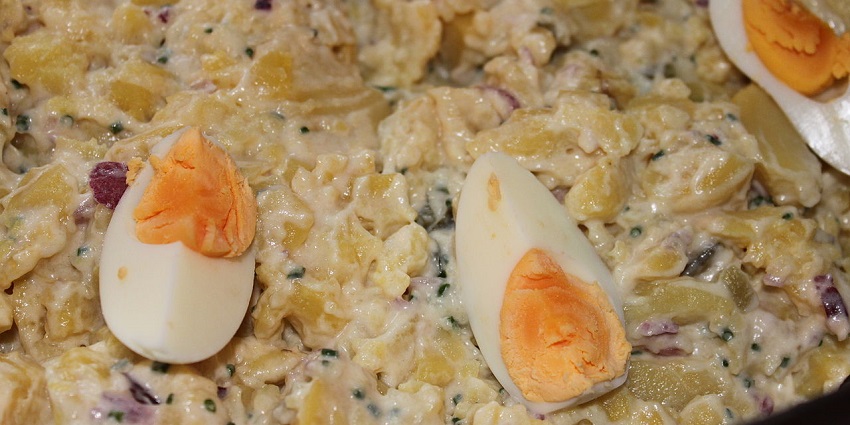
Photo: Benreis / Wikimedia Commons / Image For Representation Only
Kartoffelsalat, or potato salad, is a simple but delicious dish. It has been eaten for centuries, with each region having its recipe. It is made with vinegar and broth in southern Germany, while the northern version is creamier, using mayonnaise. Traditional Kartoffelsalat is served warm, but modern versions may include ingredients like pickles or mustard. A fun fact is that potato salad is a common dish at German Christmas dinners. It is rich in carbohydrates and pairs well with sausages and schnitzel.
Location: Stuttgart, Munich, Berlin, Frankfurt, Düsseldorf
Average Cost: ₹270 – 540
Food in Germany is diverse, offering everything from hearty meats to sweet desserts. Whether you try a classic Schnitzel, a warm Apfelstrudel, or a plate of Spätzle, each dish has its own story. The best dishes in Germany reflect the country’s culture and traditions, making it a must-try for any visitor. Explore Germany’s food scene and plan a trip with TripXL.
Cover Photo: AS Photography / Pexels / Image For Representation Only


 WhatsApp
WhatsApp
 Twitter
Twitter









